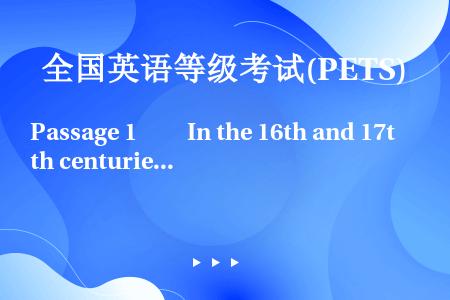 问答题
问答题
Passage 1 In the 16th and 17th centuries, two persons helped lay the foundation of modern education. Comenius, a Czech humanist, greatly influenced both educational and psycho-educational thought. He wrote texts that were based on a developmental theory and in them introduced the use of visual aids in instruction. Media and instructional research, a vital part of contemporary educational psychology, has its origins in the writing and textbook design of Comenius. (1) He recommended that instruction start with the general and then move to the particular and that nothing in books be accepted unless checked by a demonstration to the senses. He taught that understanding, not memory, is the goal of instruction; that we learn best that which we have an opportunity to teach; and that parents have a role to play in the schooling of their children. The contributions of one of our many ancestors often are overlooked, yet Juan Luis Vives wrote very much as a contemporary educational psychologist might in the first part of the 16th century. (2) He stated to teachers and others with educational responsibilities, such as those in government and commerce, that there should be an orderly presentation of the facts to be learned, and in this way he anticipated Herbart and 19th-centry psychologists. He noted that what is to be learned must be practiced, and in this way he anticipated Thorndike’s Law of Exercise. He wrote on practical knowledge and the need to engage student interest, anticipating Dewey. (3) He wrote about individual differences and about the need to adjust instruction for all students, and anticipated the work of educational and school psychologists in the area of special education. He discussed the school’s role in moral growth, anticipating the work of Dewey, Piaget, Kohlberg, and Gilligan. He wrote about learning being dependent on self-activity, a precursor to contemporary research on meta-cognition, where the ways in which the self monitors its own activities are studied. Finally, (4) Vives anticipated both the contemporary motivational theorists who avoid social comparisons and those researchers who find the harmful elements of norm-referenced testing to outweigh their advantages, by writing about the need for students to be evaluated on the basis of their own past accomplishments and not in comparison with other students. (5) Thus, long before we claimed our professional identity, there were individuals thinking intelligently about what we would eventually Call educational psychology, preparing the way for the scientific study of education.
发布日期:2022-07-07


题王网让考试变得更简单
扫码关注题王,更多免费功能准备上线!

此试题出现在
属于缩短形新敞车的车辆代码是()
在Access XP中,模块是由()编写的。
在设置厨房机构时应道循管理跨度适当的原则。下列哪种叙述是错误的?()
Sheehan综合征的病因()
烧伤后防止应激性溃疡的核心措施是()
由于新技术新工艺的应用,使汽轮机和锅炉的效率得到了提高,不少资料表明,在功率超过()和船速超过()时,汽轮机动力装置的优越性更为突出。
请开始答题:“社会人”假设是组织行为学家提出的一种与管理有关的人性假设。“社会人”假设认为,人们在工作中得到的物质利益对于调动其生产积极性是次要的,人们最重视在工作中与周围的人友好相处,良好的人际关系对于调动人的工作积极性起决定作用。根据上述定义,下列哪项是基于“社会人”假设的管理方式?( )
人员调整时,“出勤揭示板”名签未及时调整,管理人员()。
下列哪一项不属于职能战略()。
如果土工合成材料的测试是破坏性的,则只能采用全部产品进行测试。
海南省考试局关于取消2022年上半年高等学校英语应用能力考试的公告
海南省考试局关于取消2022年9月全国英语等级考试(PETS)的公告
海南省2022年下半年全国大学英语四六级和高等学校英语应用能力考试报名公告
2022年海南省下半年全国英语等级考试(PETS) 报名公告
2022上半年全国英语等级考试是什么时候?该如何备考?
2022年上半年全国英语等级考试(PETS)广东考区报考简章
全国英语等级考试(PETS)网报缴费完成后发现个人信息错误如何修改?
全国英语等级考试(PETS)常见问题解答合集(下)
全国英语等级考试(PETS)常见问题解答合集(上)
全国英语等级考试(PETS)常见问题解答:听力残疾考生如何申请听力部分免考
Passage 1 In the 16th and 17th centuries, two persons helped lay the foundation...
My Deratization Exemption Certificate will become ()on the 16th of September.
Until the 16th century Latin was taught through active use of speech and written...
In the 17th century,the English government encouraged people from Scotland and N...
The term "()" is commonly used to name the work of the 17th - century writers wh...
Unlike Passage 1, Passage 2 discusses ______.
Which of the following best describes the relationship between Passage 1 and Pas...
In this section, there is one passage followed by a summary. Read the passage ca...
Directions:In this section, there is one passage followed by 5 statements. Go ov...

